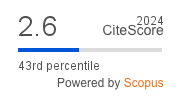Recurrence Quantification Analysis (RQA) Features vs. Traditional EEG Features for Alzheimer’s Disease Diagnosis
DOI:
https://doi.org/10.4114/intartif.vol28iss75pp170-185Keywords:
Alzheimer’s disease (AD), electroencephalogram (EEG), computer-aided-diagnosis, machine learning, recurrence quantification analysis (RQA)Abstract
Alzheimer’s disease (AD) is a neurological disorder that causes memory decline and loss of cognitive abilities. AD directly impacts the brain activity of affected individuals, which can be reflected in electroencephalogram (EEG) signals. Previous studies have typically relied on statistical, spectral, and wavelet features in order detect AD using EEG signals. Recurrence Quantification Analysis (RQA) is a non-linear technique that has been successfully used to analyze EEG signals in several other domains including emotion recognition and autism detection. However, RQA features have not yet been fully investigated for AD diagnosis. The aim of this work is to thoroughly investigate the usefulness of RQA features for AD diagnosis. Fifteen RQA features were computed along with statistical measures, Hjorth parameters, and relative power in order to compare the performance of the RQA features to other commonly utilized EEG features. All features were computed from the different brain regions. Experimental results indicated that RQA features outperformed all other feature groups regardless of the considered brain region. RQA features achieved accuracies ranging from 89.6% to 98.2% using a support machine vector (SVM) classifier with leave-one-subject-out (LOSO) cross-validation. These results are
between 25% to 40% higher than the three other considered feature groups. Feature ranking was performed to find the most relevant RQA features, identifying seven of the fifteen computed RQA features. This work sheds light on the potential of RQA features for reliable AD diagnosis and paves the way for their integration in computer-aided AD diagnostic tools using EEG signals.
Downloads
Metrics
Downloads
Published
How to Cite
Issue
Section
License
Copyright (c) 2025 Iberamia & The Authors

This work is licensed under a Creative Commons Attribution-NonCommercial 4.0 International License.
Open Access publishing.
Lic. under Creative Commons CC-BY-NC
Inteligencia Artificial (Ed. IBERAMIA)
ISSN: 1988-3064 (on line).
(C) IBERAMIA & The Authors










